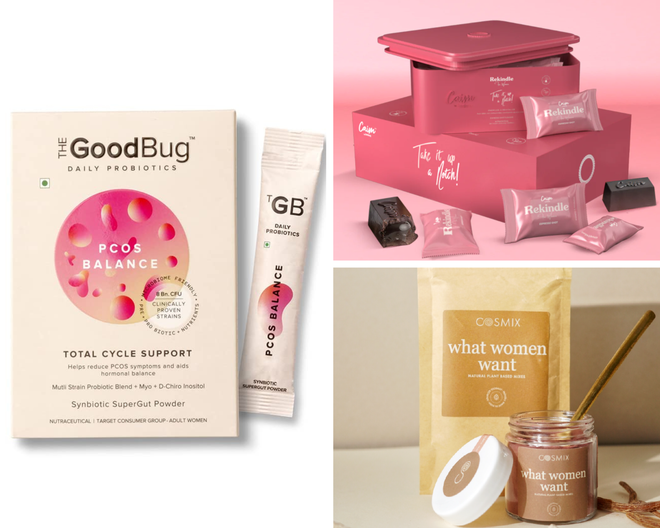Karandeep Khanna, 31, first heard of shilajit through friends. The nutrient-rich biomass found in mountain rocks is used in Ayurveda for its rejuvenating effects — most significantly, it is claimed to improve skin and bone health, and boost energy. Some of Khanna’s inner circle were consuming it as a dietary supplement, alongside ashwagandha. He, too, started taking both.
In the beginning, it gave him acne breakouts. But then he found another brand that seemed to click. “I felt sharper, more focused, and noticed my energy level rise,” he says. “Gymming felt a lot easier, and I was feeling overarching mental and physical benefits.” Since then, the Delhiite has tried a whole host of products: wheatgrass powder for metabolism, magnesium for better sleep. He’s careful to read up before each new experiment — which mainly involves collecting information online and consulting Reddit communities — but isn’t too worried about it. “Most of these are naturally-occurring substances, so they don’t have any major side effects. As long as you buy the products from a trusted brand, it’s usually okay,” he believes.
Beyond the jargon
Khanna is far from the only one buying into the hype. Melatonin gummies, probiotic fizzies, biotin for hair, even ganache chocolates for hot flashes and PCOS symptoms — it’s unlikely that you’ve missed advertisements for these new-fangled, on-the-go products that come with the promise of glowing skin, improved digestion and metabolism, restoring hormonal balance, and improving general wellness. Nutraceuticals is a broad term used to describe edible products largely derived from food sources. They are marketed as natural and with ‘no side-effects’, sometimes based on Ayurvedic principles. It’s an industry that’s growing at 21% and, according to the Ministry of Food Processing Industries, is slated to turn into a $18 billion market in India by 2025.
“If you look at most of the major players in the Indian nutraceutical industry, they’re making products in compliance with the [2016] regulatory framework. Of course, there are some companies that are ‘overclaiming.’ There may also be some selling faulty or false products. But whenever you talk of an ecosystem, there will always be defaulters. It is the FSSAI’s job to hold them accountable and make them comply”Sandeep GuptaFounder, Expert Nutraceutical Advocacy Council

The pandemic may have fuelled the surge in such wellness products, but for most users of nutraceuticals, the prospect of farm-to-gummy presents a convenient solution to address our perceived nutritional deficit, or, as it appears, an attractive way to get youthful skin or improved metabolism. “There is a huge rise in the sale and consumption of nutraceuticals,” agrees Manjari Chandra, a functional nutritionist based in New Delhi. “There are many reasons for that. First is a new-found interest in health, wellness and disease prevention, especially post-pandemic. There is a lot of information available that people can read and process, and it is easier for them to understand how it works as compared to pharmaceutical agents. Secondly, you can buy them on e-commerce websites or a store at the airport, really anywhere. They don’t require a prescription.”

The government’s push for Ayurveda is helping, too. “There is a huge impetus to making all forms of supplements, including nutraceuticals. So, now it isn’t basic shilajit or ashwagandha; it’s become clinical grade, therapeutic. There is a lot of interest and potential business there,” she adds.
What’s not addressed is the quagmire of pseudoscientific jargon, clever marketing campaigns buttressed by poorly designed small trials and foundational studies that are often not validated. Check out the packaging or scroll through websites of ‘wellness’ products and you’ll find testimonials of people who felt “better”, “healthier” or “glowy”— enough to make you add to cart, but not clinically demonstrated.
Abishesh Mohapatra, 30, was featured in one such testimonial, for Amway, the multinational health, beauty and wellness marketing company (he was not paid to try their products). A health and beauty influencer from Bhubaneshwar, Mohapatra became a convert courtesy his mother, who has severe asthma, and brother, who suffers from chronic bronchitis. Ever since they started taking the brand’s protein powder and vitamin C supplements, he says they noticed a perceivable improvement, so much so that they no longer use pumps or inhalers. But should one also consider a placebo effect?

“Nutraceuticals, plant-based infusions, herbal extracts, etc., are a huge industry that targets ‘wellness’ when even the industry giants cannot properly define what ‘wellness’ is and what aspects of it their products target to improve. These are vague, generalised terms used to market their products — much like the pointless ‘immune boosters’. Such a scientifically validated phenomenon does not exist,” says Dr. Abby Philips, of the Liver Institute, Rajagiri Hospital, in Aluva, Kerala. “A lot of people who use nutraceuticals mention that they feel better or ‘healthy’. A study done on this showed that while consumers ‘felt better’, there were no clinically demonstrable health benefits. In short, they use the product, and have an anecdotal placebo effect.”

Regulatory challenges
According to the Food Safety and Standards Authority of India (FSSAI), the certifying agency that regulates the sector, a food brand is allowed to “extract, isolate and purify nutraceuticals from food or non-food [certain barks, for instance] sources” and these can be sold as granules, powders, tablets, capsules, liquids, jellies, gels, semi-solids and other formats.
FSSAI highlights labelling requirements, lists the ingredients that are allowed, and mandates that the quantity of nutrients in a specified dosage shall not exceed the recommended daily allowance (RDA). But it is also important to note that mere vitamins and minerals in pill or powder formats are not covered as nutraceuticals except when they are added to an article of food. Similarly, minimally processed botanicals (dried or powdered, juiced or cooked) cannot be listed as nutraceuticals.

“There is not much regulation about nutraceuticals,” says functional practitioner Chandra. “The FSSAI has given guidelines about dietary allowances. Most nutraceutical companies just follow that so they don’t come under any scanning.”
Herein lies the problem that doctors and several research papers have been highlighting — the absence of large clinical trials and evidence-based science to prove the clinically-demonstrable benefits of these ingredients. On the other hand, some studies have shown toxicity and incidence of liver damage due to their use.
Which is a matter of concern because, unlike prescription pharma drugs that undergo rigorous tests for efficacy and adverse events before they’re introduced into the market, nutraceuticals and supplements are mostly free of scrutiny. Back in 2015, a report by market researcher RNCOS found that 60% to 70% of supplements on sale across India were either unregistered or unapproved. The situation may have improved after the Food Safety and Standards (Health Supplements, Nutraceuticals, Food for Special Dietary Use, Food for Special Medical Purpose, Functional Food and Novel Food) Regulations 2016, but many experts are sceptical.
“Physicians aren’t trained or have not studied nutrition or nutraceuticals. They study pharmacology as part of their course. While they have a little understanding of how micronutrients work, they may not understand other things — such as what herbs or botanicals can decrease insulin resistance or affect bioregulatory systems. So, they are not the best people to prescribe nutraceuticals”Manjari Chandra Functional nutritionist
Get a second opinion
Soumitra Dilip (name changed), a homemaker from Palakkad, Kerala, has always been proud of her youthful skin and healthy metabolism. Once she turned 50, she wanted to be proactive about her well-being. After conversations with friends, watching YouTube videos, and some reading on the Internet, she bought collagen for her skin, biotin to prevent hair fall, and protein powder to help improve her metabolism. She recently added ashwagandha for better sleep and her hypertension.
“There is more awareness about refraining from just popping pills for conditions such as hypertension or high cholesterol. People are looking for herbs that can reduce blood pressure, blood sugar, and lower triglycerides and lipids,” says Chandra. “I practise functional nutrition and integrative medicine, and a large part of what I do is reverse cardiometabolic diseases. When I prescribe nutraceuticals, I follow a route where I give them cleaner supplements, the right type, and a system of consuming it. But a section of nutritionists are also over prescribing it.”
Shivangi Bharadwaj, a coach at health and wellness programme RISE in Delhi, believes that the high stress levels today, which have led “to a lot of health problems, from hormonal imbalance and sleeplessness to hair fall, thyroid problems, and PCOS”, are behind the increasing popularity of, and dependence on, nutraceuticals. But she is worried about the trend. Take melatonin gummies — she’s seen college kids who cannot fall asleep without popping a couple each night. “They’re addicted, and that’s never good. These are everyday tasks your body should be able to do organically,” she says.

The PCOS maze
A number of products in the Indian market today, from The Good Bug’s PCOS Balance daily probiotics to Cosmix’s What Women Want adaptogenic mixes, claim to relieve a wide-range of problems, especially menstrual. They use varying combinations of ingredients, including shatavari, kapikachhu, soy isoflavones, gokhru, black cohosh, lodhra, nettle leaf, and Ashoka tree bark — but the jury is still out on the efficacy of these herbs as drugs.
Doctors argue that an ‘imbalance of hormones’ is an oversimplification of PCOS. “These brands have absolutely no idea about the disease development and progression of PCOS. Its treatment has an individualistic approach; one has to treat the conditions associated with PCOS, from menstrual irregularities and diabetes, to underlying depression/anxiety that some women may experience. Do any of the nutraceuticals address this?” questions Dr. Philips, who is outspoken about the liver damage traced to ingredients in Ayurvedic and herbal products considered “safe and without side-effects,” in the absence of evidence-backed studies to support their claims.

In May 2021, Mumbai-based Nikita Naterwalla launched Rekindle for Women, a line under her brand Caim by Arelang, to tackle symptoms of PCOS and perimenopause. “We worked on how much of a micronutrient compound actually gets absorbed by the body, enough to not harm the liver and yet provide for the benefits the compound was intended for,” she says of her product, which comes as chocolate bars infused with herbs and soy isoflavones. A claim that is not supported by any scientific, case controlled study. It’s crucial to note that there is no established RDA for the herbs used in these products (as indicated on the product label), and the “studies” her company have conducted do not have a hypothesis, design or methodology, and have not been published or peer reviewed. “It’s hard to get quantifiable results particularly when you’re testing for oestrogen, which gets used by the body very easily,” says Naterwalla, adding that those who have used the product over a three-month period have seen results: regulated period cycles, reduced period pain. But according to Dr. Philips, “Studies like these can only be called company data and will not hold water in any scientific discussion and cannot be used for evidentiary purposes.”
“The medical academia, of both Ayurveda and modern medicine, needs to be proactive in countering false propaganda in matters related to health. A social ecosystem that promotes a healthy lifestyle should be built. The contrary seems to be happening. Ironically, even promoters of the yoga lifestyle have become peddlers of nutraceutical quick-fixes.”G.L. KrishnaAyurveda doctor
Checks and balances
Functional nutritionist Chandra can see parallels between how nutraceuticals gained popularity in the U.S. and is now doing so in India. “Regulations are more stringent in the U.S. now, while we are still quite primitive in terms of it. Clinical trials are not considered mandatory because these are bioidentical in nature,” she says, adding, “nutraceuticals don’t work like pharma drugs. They have a long-term, diffused impact that is not clearly quantifiable. But it does help in patient recovery. The problem is that with more companies making it, and with few regulations, quality needs to be looked into. I have seen a few compounding pharmacies, and you’ll never buy a nutraceutical from them.”
It is time to put the supplements industry through the grinder, with better regulation and bigger studies to test the efficacy and adverse events associated with them, adds Dr. Philips (also knows as the liver doctor on Twitter). “Only this will help in identifying realistic benefits, or lack thereof, of these supplements and also give us knowledge on toxicity of specific components,” he concludes.







